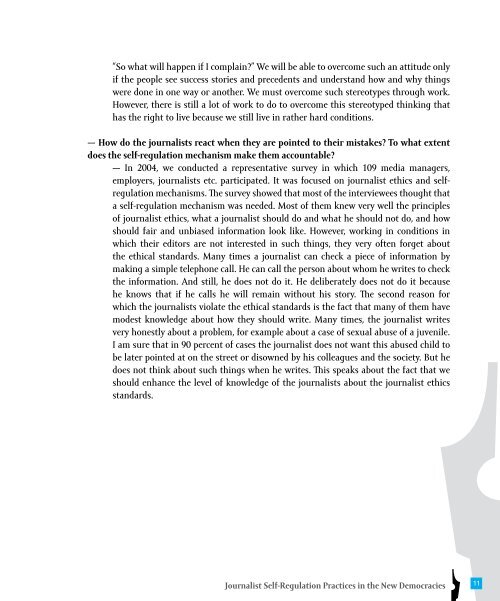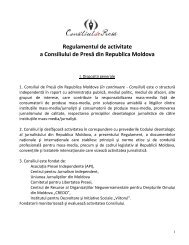Journalist Self-Regulation Practices in the New Democracies - Unesco
Journalist Self-Regulation Practices in the New Democracies - Unesco
Journalist Self-Regulation Practices in the New Democracies - Unesco
Create successful ePaper yourself
Turn your PDF publications into a flip-book with our unique Google optimized e-Paper software.
“So what will happen if I compla<strong>in</strong>” We will be able to overcome such an attitude only<br />
if <strong>the</strong> people see success stories and precedents and understand how and why th<strong>in</strong>gs<br />
were done <strong>in</strong> one way or ano<strong>the</strong>r. We must overcome such stereotypes through work.<br />
However, <strong>the</strong>re is still a lot of work to do to overcome this stereotyped th<strong>in</strong>k<strong>in</strong>g that<br />
has <strong>the</strong> right to live because we still live <strong>in</strong> ra<strong>the</strong>r hard conditions.<br />
— How do <strong>the</strong> journalists react when <strong>the</strong>y are po<strong>in</strong>ted to <strong>the</strong>ir mistakes To what extent<br />
does <strong>the</strong> self-regulation mechanism make <strong>the</strong>m accountable<br />
— In 2004, we conducted a representative survey <strong>in</strong> which 109 media managers,<br />
employers, journalists etc. participated. It was focused on journalist ethics and selfregulation<br />
mechanisms. The survey showed that most of <strong>the</strong> <strong>in</strong>terviewees thought that<br />
a self-regulation mechanism was needed. Most of <strong>the</strong>m knew very well <strong>the</strong> pr<strong>in</strong>ciples<br />
of journalist ethics, what a journalist should do and what he should not do, and how<br />
should fair and unbiased <strong>in</strong>formation look like. However, work<strong>in</strong>g <strong>in</strong> conditions <strong>in</strong><br />
which <strong>the</strong>ir editors are not <strong>in</strong>terested <strong>in</strong> such th<strong>in</strong>gs, <strong>the</strong>y very often forget about<br />
<strong>the</strong> ethical standards. Many times a journalist can check a piece of <strong>in</strong>formation by<br />
mak<strong>in</strong>g a simple telephone call. He can call <strong>the</strong> person about whom he writes to check<br />
<strong>the</strong> <strong>in</strong>formation. And still, he does not do it. He deliberately does not do it because<br />
he knows that if he calls he will rema<strong>in</strong> without his story. The second reason for<br />
which <strong>the</strong> journalists violate <strong>the</strong> ethical standards is <strong>the</strong> fact that many of <strong>the</strong>m have<br />
modest knowledge about how <strong>the</strong>y should write. Many times, <strong>the</strong> journalist writes<br />
very honestly about a problem, for example about a case of sexual abuse of a juvenile.<br />
I am sure that <strong>in</strong> 90 percent of cases <strong>the</strong> journalist does not want this abused child to<br />
be later po<strong>in</strong>ted at on <strong>the</strong> street or disowned by his colleagues and <strong>the</strong> society. But he<br />
does not th<strong>in</strong>k about such th<strong>in</strong>gs when he writes. This speaks about <strong>the</strong> fact that we<br />
should enhance <strong>the</strong> level of knowledge of <strong>the</strong> journalists about <strong>the</strong> journalist ethics<br />
standards.<br />
<strong>Journalist</strong> <strong>Self</strong>-<strong>Regulation</strong> <strong>Practices</strong> <strong>in</strong> <strong>the</strong> <strong>New</strong> <strong>Democracies</strong><br />
11



